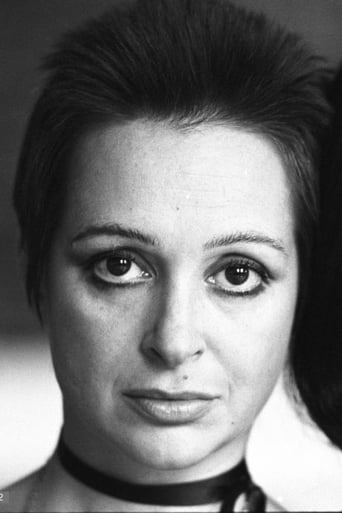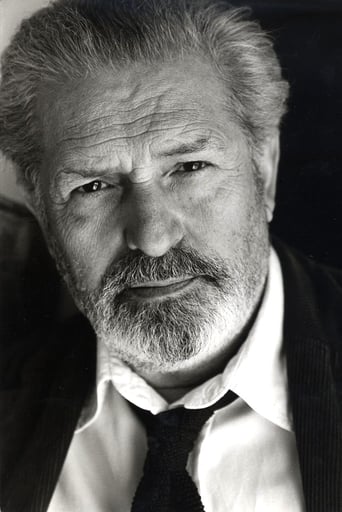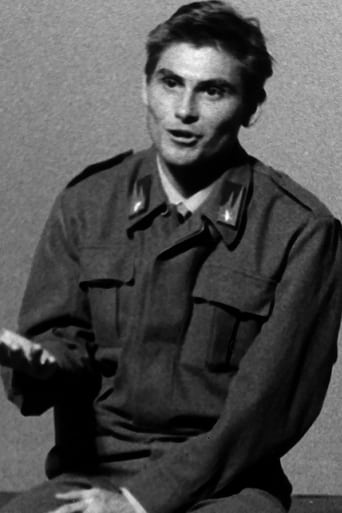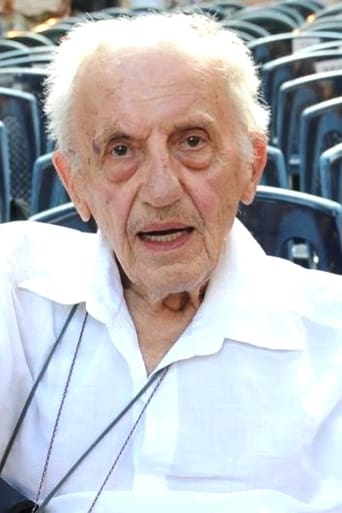Laikals
The greatest movie ever made..!
Afouotos
Although it has its amusing moments, in eneral the plot does not convince.
Whitech
It is not only a funny movie, but it allows a great amount of joy for anyone who watches it.
Zandra
The movie turns out to be a little better than the average. Starting from a romantic formula often seen in the cinema, it ends in the most predictable (and somewhat bland) way.
Andrew Boone
Bernardo Bertolucci was probably the last in the line of great filmmakers from Italian cinema's heyday. The neorealist movement, helmed by Rossellini, De Sica, and Visconti, brought Italian cinema into the spotlight in the mid-'40s. The next generation, who had apprenticed under the neorealists, included Fellini, Antonioni, and Monicelli. Following that, Pasolini apprenticed under Fellini, and then, finally, Bertolucci apprenticed under Pasolini. This is all a bit of an oversimplification, mind you, but that's approximately how we arrive at Bertolucci on the Italian cinematic family tree."Before the Revolution", released in 1964, was Bertolucci's second film. His 1962 debut effort, "La commare secca" (a.k.a. "The Grim Reaper"), had been a critical success, although I'd call it only a good film, not a great one. Pasolini's influence is very evident in both films.Bertolucci is clearly a student of cinema. The era of "new wave" directors, who came around in about 1960 and engendered a changing of the guard all across the cinematic landscape, were notable for being the first generation of filmmakers to have any significant critical background. Previous generations of filmmakers had no serious, consistent means of exploring the cinema of other countries, not to mention other generations. These '60s filmmakers, however, thanks to the likes of Langlois and Bazin, were raised on film clubs and therefore exposed to a much wider spectrum of the cinema. As a result, this era of filmmaking is the first to be so heavily subject to that all-important aspect of the cinematic process: influence.It's never difficult to identify a director who has an immense love for cinema. Their films are filled with allusions, pastiche, and references galore, and they exhibit all sorts of influences stemming from different cinematic styles. Bertolucci is one such filmmaker, and "Before the Revolution" is one such film. This is most obvious in one scene, which features explicit dialogue regarding the political merits of many contemporaneous filmmakers, but even aside from that, we can detect a vast world of inspirations in this film. "Before the Revolution" is like an amalgam of Pasolini, Godard, and a left bank nouvelle vague director like Resnais or Varda. Godard's jump cuts and playful style are present at times. We see compositions that are distinctly reminiscent of Varda's "La Pointe-Courte" or Resnais's "Hiroshima mon amour" (similar compositions can also be seen in Antonioni's early '60s work, such as "L'eclisse", as well as in Bergman's "Persona" and Godard's "Une femme mariée"). Most notably, the film shares Pasolini's proclivity for a highly poetic form of cinema. There is poetic narration, but like "Accattone" or "Mamma Roma", the core of the film's poetry is in its visual style.Visually, "Before the Revolution" is absolutely stunning. It's formally impeccable, and the cinematography warrants some analysis. At times it emulates Pasolini's unique pseudo-realist technique, and at other times it is much more formal, featuring very slow, smooth, graceful, poetic camera-work. Some of these latter shots are very much ahead of their time, reminding me of the more recent films of Terrence Malick, or Sorrentino's "The Great Beauty". We can see a good deal of virtuosity in the young Bertolucci here.As for the film's content, it's very much a communist film, focusing on all the usual topics: revolution, the bourgeoisie, et cetera. The film's protagonist is Fabrizio, a young man who has committed himself to the revolution and to breaking free of his bourgeois chains. The film's other two central characters are Cesare, Fabrizio's revolutionary mentor, and Gina, Fabrizio's aunt with whom he begins a love affair. Each character plays their role. Fabrizio is the bourgeoisie, Cesare the revolutionary, and Gina the troubled soul, essentially apolitical because she is too wrapped up in her own existential angst to concern herself with political or revolutionary action. Cesare tries to win Fabrizio over to the revolutionary cause, and Fabrizio wants to be won over, but is he truly committed? Can a bourgeoisie ever be truly committed to the revolution, or will he always bow out "before the revolution" materializes? Perhaps he has too much to lose to truly act on his ideals when the moment for action finally arrives. This was the core of the conflict between workers and students within the revolutionary movement, discussed at length in Godard's "A Film Like Any Other". Workers fought the revolution out of necessity, but the students could always go home to mommy and daddy as soon as the fire got too hot. As outmoded as they may sound in America today, these ideas were central to political cinema for a long time. This issue — the complexities of attempting to break the oppressive bonds of bourgeois society — has been the subject of a great many political films, and it is again here. I'd like to think of "Before the Revolution" as a film about the difficulties of achieving social change, the aspects of the human condition that drive individuals to revolt against society, and the basic need for comfort and security that ultimately undermines the ideals of those who act out of ideology and not practical necessity. The film can certainly be seen that way, and I, personally, want to think of it in those terms because I am not a political person. I'm more interested in subjective portrayals of one individual's vision of life than I am in the politics of revolution. That being said, what Bertolucci intended here was probably not a subjective contemplation of the futility of revolution, but rather an objective reflection on the necessity for total revolution — the need to wipe out every trace of bourgeois society in order to achieve any genuine positive social change. Like most great films, a lot is left open to interpretation here, although maybe less than what appears at first glance, if you know the politics of the time. Certainly, this is an immensely complex, largely under-appreciated, and truly great film. RATING: 9.00 out of 10 stars
runamokprods
While hailed as many as a masterpiece (or near), I struggled with Bertolucci's 2nd film, made when he was only 23, although I am a fan of his in general. Beautifully shot, great use of music and unconventional editing, the film is excellent on a film-making and craft level (although it perhaps borrows too liberally from leading film-makers of the era, especially Godard, Antonioni and Resnais). The story of a young bourgeois man trying to come to terms with his tear between his attraction to communism and his desire for an easier life leads him into an incestuous affair with his somewhat older aunt. I found it's themes somewhat muddled, alternating between being heavy-handedly spelled out, or so obtuse I wasn't sure what a given scene was saying. The acting in particular seems a bit all over the place; understated to the point of flatness in one scene, and then almost theatrically over the top the next. At the end I felt glad I'd seen the film, but it didn't stick with me the way Bertolucci's first film "La Commare Secca" or his third "Partner" did. ("Partner" deals with some of the same themes, but in a far more playful, often comedic way). There was a film-school sort of pretentiousness and emotional distance in "Before the Revolution that kept me from feeling moved or from being led to think deeply about the ideas. That said, I am willing to revisit it and see if my reaction changes, and certainly I enjoyed Bertolucci's already masterful use of image and sound, even if the ends he was using them to were a bit muddled.
Daryl Chin (lqualls-dchin)
One of the typical ploys of modernist artists has been to take a known work, and to use that as a basis for experimentation. In this case, Bernardo Bertolucci (at the age of 22!) took Stendhal's novel THE CHARTERHOUSE OF PARMA and used the basic plot and characters, only Bertolucci abstracted these elements, taking them for granted and simply creating a wide-ranging collage of impressions and emotions. But the central love affair between Fabrizio and his aunt, Gina (the names of the characters in the Stendhal), is the motivating heart of the film; the suggestions of incest, the need for secrecy, the impacted emotion because of the covertness: these provide PRIMA DELLA RIVOLUZIONE with a core of great integrity, so that the more "random" elements (the scene with the lament on the lake, the scene at the opera, the scene where the friend rides the bicycle in circles, etc.) are able to reflect on Bertolucci's feelings regarding politics, class, revolution, art, the search for belief.PRIMA DELLA RIVOLUZIONE is one of the most youthful films ever made, as well it should be, since it was made by someone who was impossibly young at the time. I hate to say this, but it's the work of a prodigy, a gifted post-adolescent who is trying to find a form to contain his sometimes overwrought feelings about life, love, and politics. There had been many works catering to the teen crowd, movies like WHERE THE BOYS ARE or BEACH PARTY, but, aside from some of the works of Nicholas Ray (THEY LIVE BY NIGHT and REBEL WITHOUT A CAUSE), no film artist had yet tried to use the medium as a vehicle for a vision of youthful passions from the inside: Godard would follow with MASCULINE FEMININE and LA CHINOISE, Bertolucci with FISTS IN THE POCKET, Skolimowski with LE DEPART and DEEP END, but Bertolucci was pioneering when he made this movie, and the fact that it's "flawed" should not be held against it, as it represents the expression of a very young artist, trying to express his emotions as directly as possible.
Renelson Antonius Morelos
For a while, forget about Bernardo Bertolucci's "ventures into Hollywood" (for example, "Little Buddha," featuring Keannu Reeves) and find time to see his "little-known" work, "Before the Revolution" (his second feature film, which was made in his native country and when he was just 22 years old).More than a "nostalgic" tribute to the "present," the film is closer in spirit and style to the French New Wave films (see, for example, Jean-Luc Godard's "A Bout de Souffle" and Francois Truffaut's "Jules et Jim";as a matter of fact, Bertolucci's film was contemporaneous with these works).In the film, you'll find a bedazzling mixture of narrative styles (those relating to camera movements and angles, editing, photographic effects and musical score;my favorites are the "optical room" scene and the old man painting by the lakeside), characters who are always "running away" from something (from social conventions and pressures, from others as well as from themselves) and for whom to live is to discourse (with other people or with themselves), and a "romantic" and "apolitical" stance toward a relevant sociopolitical issue ( in this case, the workers' uprising and the Revolution of 1948).Initially slow and hard to get by, but the film eventually engages the viewers' attention as "love" starts to develop between the aunt (Gina) and the nephew (Fabrizio), which other people may find "scandalous," but is treated in such a casual and indifferent manner that the result is "unaffecting" (much like the way the menage-a-trois was treated in "Jules et Jim"), and as one gets to know more (or does one?) the quirky and enigmatic characters.





